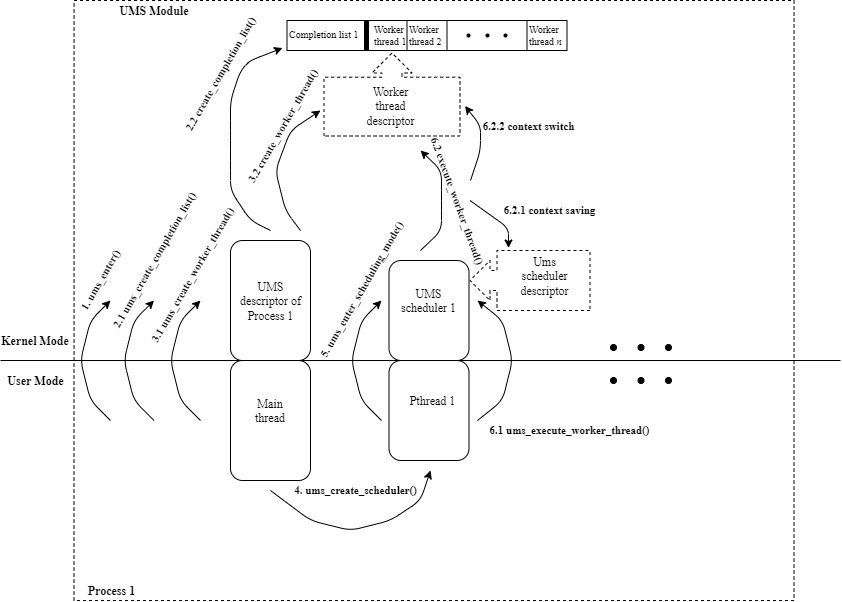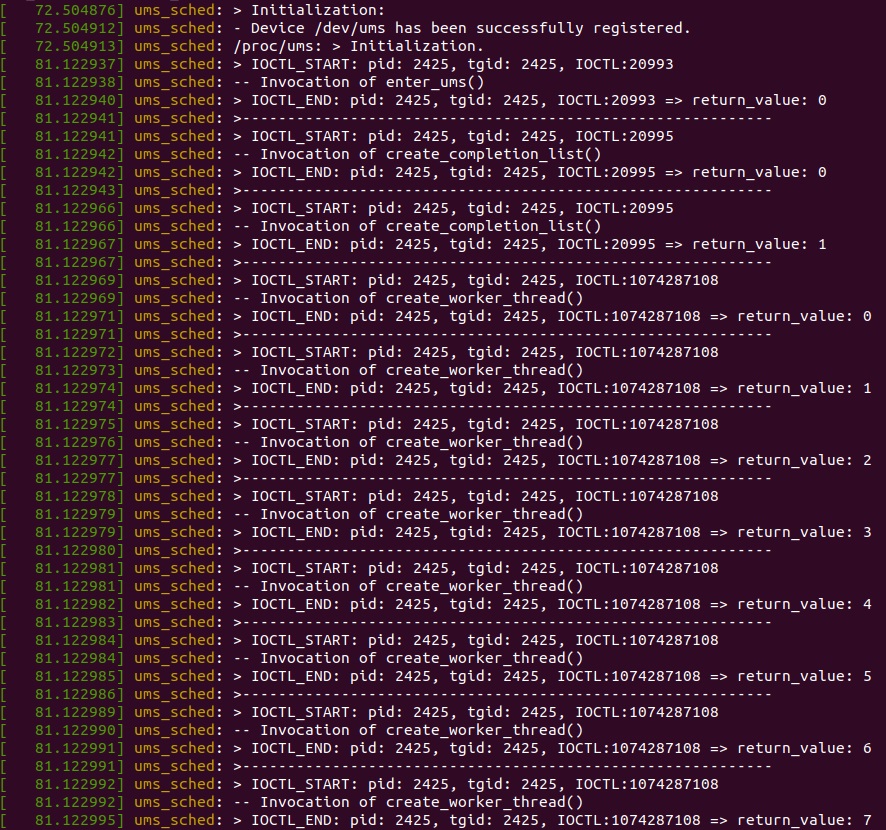
Bektur Umarbaev
Monday, June 26, 2023 | 4 minutes
[Projects] User-mode Scheduling (UMS)
1. Introduction
- User-mode scheduling (UMS) is a lightweight mechanism that applications can use to schedule their own threads [1].
- It allows the programmer of a C user space application to schedule threads without involving the kernel scheduler.
- The overview of the mechanism is described by Dave Probert in [4] or can be found by searching for his interview on Microsoft Learn [5], since his interview from Channel 9 was moved there [6].
- The project was implemented based on specifications described in [2].
2. Design
- The design was inspired by Dave Probert’s interview [4] and the patent for UMS on Windows [7]:

- In general:
- UMS module is responsible for management of UMS mechanism.
- It receives requests from processes, stores respective data structures (process, scheduler, worker thread descriptors and completion lists) and performs requested actions.
- The process which intents to use UMS has to register itself in UMS module, create required completion lists, create and assign worker threads to completion lists and then create schedulers associated with completion lists.
- Schedulers are in charge of determining which worker thread has to be scheduled.
- Multiple schedulers can share completion lists.
- Scheduler hosts the execution of the worker threads.
3. Implementation
- The project consists of
UMS kernel module and UMS library. - The general execution flow is depicted as follow:

- The execution flow was inspired by an example provided in [3].
- Execution flow in steps:
- Process calls
ums_enter() to request UMS module to manage the current process. - Process calls
ums_create_completion_list() to request creation of the completion list.- This step is continued until all required completion lists are created.
- Process calls
ums_create_worker_thread() to request creation of the worker thread.- This step is continued until all required worker threads are created.
- Process calls
ums_create_scheduler() to request creation of the pthread [8] that will become the scheduler.- This step is continued until all required scheduler are created.
- After pthread is created, it calls
ums_enter_scheduling_mode() to convert itself to a scheduler.- Subsequently, scheduler jumps to an entrypoint, a function that is executed to determine the next worker thread for scheduling (it is called when a the scheduler is started the first time, and when a worker thread yeilds).
- In this step, scheduler usually calls
ums_dequeue_completion_list_items() to obtain a list available threads to run.
- After finding the worker thread for scheduling, scheduler calls
ums_execute_worker(), which consists of 2 parts to perform a full context switch:- Saving the current context of the scheduler
- Loading the context switch of the worker thread
- All these steps are continued until all the work is completed.
- Then the scheduler calls
ums_exit_scheduling_mode() to convert itself back to pthread and finishes the work via pthread_exit()
- The main thread of the process waits for all pthreads (schedulers) to complete their work and then calls
ums_exit() to notify the UMS module about the completion.
3.1. Module
- The module consists of:
ums_dev.h and ums_dev.c - responsible for UMS miscdevice and its’ implementation, also includes other headers required by UMS device to function properly.ums_api.h and ums_api.c - contain essential functions, data structures and proc filesystem of the UMS kernel module and their implementations.const.h - is a set of data structures and other constant variables used by UMS kernel module to handle requests from processes.
3.2. Library
- The library consists of:
ums_lib.h and ums_lib.c - contain essential UMS library functions and their implementations.- The header has to be included by the user in order to use the
UMS library. - The header is dependent on
const.h and list.h headers described below.
const.h - is a set of data structures and other constant variables used by UMS library to make ioctl calls.- It is somewhat similar to
const.h from the UMS module, but it was made as a separate file to make library independent from the module sources.
list.h - is the implementation of the Linux kernel linked list and hash list data structures for user space and was downloaded from [9].
Results
- The project was run on
Ubuntu 20.04.2 LTS by using 2-core virtual machine via VirtualBox.- The version of the kernel was
Linux 5.8.0-55-generic.
- Example with 2 schedulers with separate completion lists depicted below:


- The
UMS module information log:

- As a benchmark statistics, the switching time for schedulers was on average within
250-360 nanoseconds.- Note that, there were situations with schedulers that share the same completion list, where only one scheduler completed all the work leaving other schedulers without any work.
- It was due to the fact that the schedulers are viewed as a simple threads by the linux system.
- Thus it was system scheduler’s decision to run only one scheduler thread, which happened to finish all the work before other scheduler threads were woken up.
References





